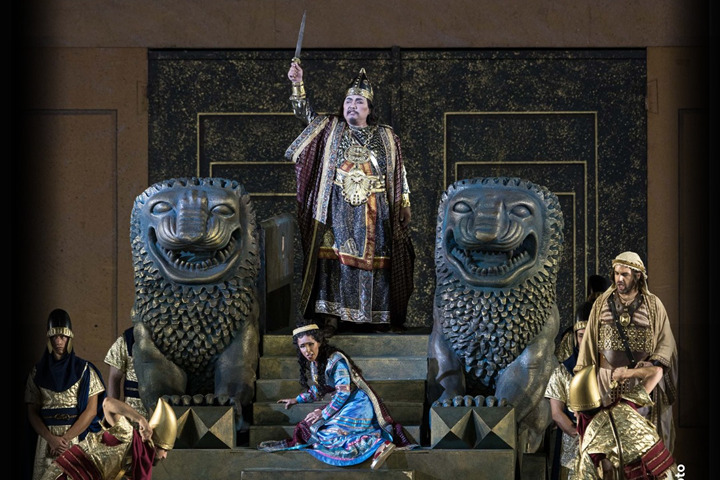| Opera Reviews | 17 May 2024 |
Amartuvshin Enkhbat brings star power to the Arena di Veronaby Silvia Luraghi |
|
Verdi: Nabucco |
|

Amartuvshin Enkhbat (Nabucco), Ensemble
|
|
|
Giuseppe Verdi’s third opera, Nabucco, is a perfect fit for the Arena di Verona’s large stage, on account of the important role played by the chorus, with a large number of people on stage providing part of the setting to the action. Gianfranco de Bosio’s classic production, which has had several revivals since its 1991 premiere with imposing sets by Rinaldo Olivieri, topped by a giant tower of Babel, opened on July 15, starring baritone Amartuvshin Enkhbat in the tile role, in front of an almost sold out theater. The brownish-grayish sets combined with the Arena’s stone steps, which provided a useful background, from which the Assyrian guards in colorful costumes watched Nabucco’s palace or guarded the Jewish captives. At his first appearance, Nabucco is pulled on stage on a giant throne with armrests shaped as lions. When he proclaims himself god, lightning appears in the background which strikes him and he falls on the stage throwing his crown away. In the finale, the tower’s walls split, indicating the collapse of Babylon’s walls. On this colorless background, the Jews gather to mourn their sad doom. The chorus, the opera’s main protagonist, opened the performance and enjoyed its highest point,as is predictable, in the third act with audience favorite “Va pensiero”, which was met with huge applause and encored, as is tradition at the Arena. Baritone Amartuvshin Enkhbat was an outstanding Nabucco. His sizable voice easily dominates the large open space of the Arena, allowing him to produce perfectly modulated (and audible) piani when needed. I found especially impressive his rendition of the aria “Chi mi toglie il regio scettro” at the end of the second act, showing the bewilderment of Nabucco, struck by lightning that leads him to folly. The equally important role of Nabucco’s stepdaughter Abigaille was played by soprano Maria José Siri, who sounded at odds with the killing high register sounding often out of control. She did better in the lyrical parts, as in the touching “Anch'io dischiuso un giorno” at the opening of the second act. Bass Alexander Vinogradov was an authoritative Zaccaria, who interpreted convincingly the role of the spiritual and political leader of his people. Tenor Matteo Mezzaro lent his lyrical voice to Ismaele, joined by mezzo José Maria Lo Monaco, an idiomatic Fenena. Bass Gianfranco Montresor as Gran Sacerdote di Belo also deserves mention for his tasteful interpretation and his handsomely colored voice. The orchestra was conducted with enthusiasm by Maestro Daniel Oren. The performance, with three quite long intermissions, ended at one o’clock in the morning, but this did not prevent the audience from showing their appreciation with long and repeated applause and cheers for all the protagonists.
|
|
| Text ©
Silvia Luraghi Photo © Foto Ennevi / Fondazione Arena di Verona |
|







